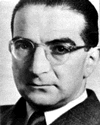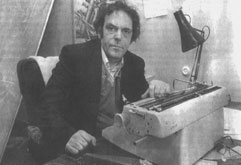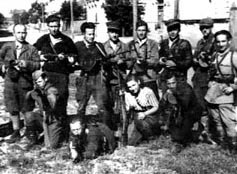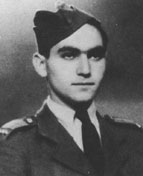Co-editors: Seán Mac Mathúna • John Heathcote
Consulting editor: Themistocles Hoetis
Field Correspondent: Allen Hougland
Rudolf
Kasztner THE
KASTNER TRIAL - shown at the Jewish Film Festival in
1997 Shamash:
The
Jewish Internet Consortium: Holocaust Home
Page Read an Interview
conducted with Jim Allen conducted in 1995 and a
Obituary
on World
Socialist Web Site. The first attempts to show Jim
Allen's play Perdition in Britain and Ireland
resulted in it being banned. It was first surpressed in
London during 1987, after fierce protests from
Zionists forced the Royal Court in London, England to pull
the play 48 hours before it's preview. It has since been
described as "the most controversial play of the 1980s"
(1). Allen, a longtime creative
partner of the British film maker Ken
Loach, wrote the
award winning films Hidden Agenda, Raining
Stones and Land and Freedom. Loach was also to
have directed Perdition at the Royal Court. After Jim
Allen died in June 1999, Loach said in his obituary in
The Guardian (27th June 1999) that "One of the
pleasures of his last days was its current successful
revival at the Gate Theatre, Notting Hill". Loach summed up
the story behind the play: it was how "some Zionists" in
Hungary in 1944 had done a deal with the Nazi's: Loach also observed how
previous attacks on Allen and the play: In a 1995 interview,
immediately following the release of Land and Freedom,
Barbara Slaughter and Vicky Short interviewed Allen who
recounted the problems he had putting on the play. The full
text of the interview can be seen on the
World
Socialist Web Site. Perdition was a very bad
experience. I got my bank statement the other day and my
overdraft, the lowest it's been, is now £3,000
despite the fact that I've written about four films in
six years. We were £20,000 out of pocket for the
libel action and that's a killer. A publisher was
involved and he paid a lot. But it's very time consuming.
I've followed this for six years. I got an apology from the
Telegraph and £5,000, which didn't cover anything.
We never got it on the
stage except a shortened version at the Edinburgh film
festival, where it appeared for one night. The bloke who
put it on said, "I've never ever known such pressure, I'm
a nervous wreck. The phone never stopped ringing, from
all over the world." One Zionist leader in London said to
Ken Loach, "I've got six friends who are very powerful,
and we'll stop it going out." A big producer in the
West End did agreed to stage it. Within 24 hours he
phoned back and said to Ken, "I'm sorry, forget it, I've
had phone calls telling me if I put Perdition on, I will
never open again on Broadway. I'm sorry." The campaign they
orchestrated with the press was incredible. It was
attacked in America. I was sent a 20,000 word article
printed in the New Republic. I replied in 1,000 words to
make sure I got it in. Three months later I got a letter
back saying, "You will be given the same liberty as any
other writer in our magazine" - 100 words or something,
in our letter column. Arising out of that came
the libel action. For two years I think my earnings were
about £10 a week, plus I was going through a bad
time personally because of my wife's illness-phone calls,
abuse. You've got no idea what it was like.
A group of us put it on
for a week in London, in some secular society. We showed
the shortened version. It was packed, mainly by Jewish
people, because this was a chapter of their history they
didn't know, like Land and Freedom for the Spanish
people. I am not exaggerating, there were some people
crying, old people, because of the facts that came out in
the play about the Zionists doing everything they could
to disorganise the Jews, in Hungary, etc. I said to Ken,
"If ever I win the lottery the first thing I'll do is
hire a theatre and put it on." Apart from that there is
no chance. Thus, we see the reason for the
plays controversy: it shows how some of the leaders of the
Zionist movement in occupied Europe collaborated with the
Nazi's in the Final Solution of the Jewish people of
Hungary. The play is based on an infamous libel trial in
Israel during the 1950s, and centres on the head of the
Zionist Rescue Committee, Rudolf Kasztner. He sued a
pamphleteer for claiming that he help the Nazi's exterminate
500,000 of his own people after admitting to negotiating
with the the SS war criminal Adolph Eichmann for the safe
passage out of Hungary of just 2000 Jews - many of whom were
Zionists from his home town in Hungary. When the play has been shown
again in London, the controversy was reawakened. Elliot
Levey, the Jewish actor who directed the new production,
said: "It is not historically inaccurate". However, Zionists
again attempted to apply maximum pressure to have the play
stopped. In a letter to The Guardian (April 26th
1999), David Menton of the Union of Jewish Students
suggested that the play was both "Holocaust revisionism" and
therefore "one of the most vicious forms of anti-Semitism".
He also cites the author David Cesarani as condemning the
play for its "revisionism". Neville Nagler, the director
general of the Board of Deputies of British Jews claimed in
a letter to The Guardian (April 26th 1999), that
Perdition was a "travesty of reality" and "grossly
distorts historical fact". But does it ? The main argument
of the critics, is that Perdition should be banned
because they claim that the basis of which the play is based
is historically inaccurate, and therefore is "holocaust
revisionism". But l would argue that if the
allegations of the play are true - and there is much
evidence to support this - then it is the Union of Jewish
Students and the Board of Deputies of British Jews who are
revising the history of the Holocaust - by claiming that
this shameful collaboration with the Nazi's never happened.
Thus, it is vital in the interest of free speech that people
can see Perdition and make their own minds up. Are we
to believe that Ken Loach, a respected left-wing film maker
would associate himself in any way with a play which was
based on events in the holocaust which are untrue or
anti-Semitic ? There is a story here which the Zionists do
not want you to know and l believe they are making
allegations - which they cannot back up with evidence - to
stop a free and open debate about the role of the Zionist
movement in the war and its collaboration with the Nazi
regime. By making these allegations l
am not attempting to give the impression that that the Jews
collaborated with Hitler in the Holocaust. What happened in
Hungary in 1944 was an isolated incident of collaboration
not by the Jewish people of Hungary but by their Zionist
leadership who trusted them and who never believed that they
would be betrayed in such a way by Kasztner and his
associates. The facts speak for themselves: while Kasztner
sipped brandy and smoked cigars with the Nazi mass-murderer
Adolph Eichmann, 12,000 Jews a day were going to the gas
chambers of Auschwitz - as pointed out by
Rabbi
Weissmandel: Out of
some 700,000 Jews then in Hungary, some 476,000 would
perish. Only 1600 Jews were saved by Kasztner - mainly his
friends, family from his home town of Cluj. The central
question here - and one of the main reasons why we are
publishing this on our website - is about resistance or
collaboration: Would have many Jews have died in Hungary if
there had been a mass uprising ? Remember what happened in
the Warsaw Ghetto in 1943 - the heroic struggle by it's
defenders - almost exclusively Bundists, Communists,
Agudists, kept the Nazi's at bay for over a month - longer
than it took them to conquer France in 1940. Imagine if such
resistance had been organised in Hungary in 1944 - the Red
Army was at the Hungarian border, Nazi Germany was on it's
knees as a result of the Allied bombing campaign, and
everywhere Germany was in retreat. Not only would the Jews
of Hungary have resisted if they knew their fate, many more
could have fled to Romania or taken to the hills. Thus,
there were more factors in favour of a successful revolt in
Hungary in 1944 that in Poland the previous year. Instead,
as shown in Perdition, Kasztner and his associates
choose, for example, to have postcards distributed amongst
the Hungarian Jews written by their brethren under duress in
Auschwitz, saying effectively: don't worry, it's just a
labour camp, everything will be all right. Thus we arrive at the central
allegation of Jim Allen's play Perdition - that the
Zionist leadership of Hungary bought their freedom in a
shameful deal with Eichmann, whilst the Jews of Hungary were
led to the gas chambers. As Rudlof Vrba pointed
out: Finally, l am not attempting
either to revise the history of the Holocaust or deny the
fact that six million Jews were murdered by the Nazi's
during the last war. The purpose of Flame's coverage of this
case is to examine the evidence of this controversial case
so that you can make up your mind and decide whether it is
true or not. When Perdition was
surpressed in London, Allen and Loach attempted to get it
shown at the Olympia Theatre in Dublin. Before, long
however, the theatre pulled out, and Perdition joined
the ranks of hundreds of plays and books that have banned or
surpressed in Ireland. The Irish writer Eamonn McGann was
one of few journalists in Ireland to condemn to banning of
Perdition in Dublin in 1987. On 16th March 1989, he
wrote the following article in the Irish magazine In
Dublin: Perdition was originally
written for The Royal Court Theatre in London and was in
the final stages of rehearsal - with, if it matters,
Gabriel Byrne in the lead - when an outcry
well-orchestrated by leading British Zionists unnerved
the Royal Court's managament. The play was cancelled a
few days before its scheduled first night. Perdition's theme was the
collusion between Zionist leaders and Nazis in Eastern
Europe during World War Two, a collusion which might at
first sight seem grotesquely unlikely but which was based
on the fact that Zionism and Nazism share one key idea -
that Jews are differant, to the extent that they cannot
be, and should not seek to be, assimilated into
non-Jewish society. After the Royal Court
management shamefully backed down and cancelled the play,
Jim Allenand his director Ken Loach tried assiduously,
but in vain, to find a London theatre willing to defy
Zionist wrath. At last they came to Dublin and believed
that they had reached agreement with the Olympia. But
howls of protest from local censors persuaded the
relevant authorities that staging the play would prove an
unprofitable venture, and Perdition was
dropped. If mention of these
events doesn't clang any loud bell it's because only a
small fuss was raised at the time. Indeed l have recently
read a number of articles and editorials in Irish
publications about the Rushdie affair which, reasonably
enough, have ranged over examples of censorship and abuse
of writers in Ireland through the decades. The Playboy,
the Plough, the Rose Tattoo etc: in none of them that l
have seen has the supression of Perdition been
mentioned. It's as if Irish literary
society has blotted the fact out of its collective
memory. (Reproduced from Dear God:
The Price of Religion in Ireland. Eamonn McCann,
Bookmarks, London, England, 1999). Dr.
Rudolf Vrba, Auschwitz survivor,
1961 Yitzhak
Greenbaum, Tel Aviv, Palestine, February 18th,
1943. Who was the Nazi collaborator
Rudolf (Rezso) Kasztner ? According to an entry in The
Encyclopedia of Zionism and Israel, he was a Journalist,
lawyer, and Zionist leader, born in Kolozsvár (Cluj),
Hungary in 1906. A lifelong Zionist, he was a lawyer by
training, and was editor of the Zionist Hungarian-Jewish
newspaper Uj Kelet (New Middle East) from 1925 to
1940. In 1942 he was involved in attempts to rescue Jewish
refugees from Slovakia and Poland. In December 1942,
Kasztner met Oskar Schindler (of Schindler's List
fame), when he traveled to Hungary. After the Nazi takeover
of Hungary in March 1944, he was involved negotiations with
the Nazis, notably, with Eichmann who had come to Hungary to
effect a "final solution" to the Jewish "problem". With
Kasztner, an agreement was reached to spare some Jewish
lives and permit the emigration of Jews to Palestine and
elsewhere in exchange for large quantities of war material
to be purchased in neutral countries by Jewish organizations
and delivered to the Germans. Rudolf Vrba, one of the few
people to escape Auschwitz Kasztner was accused of
dressing up in an SS uniform and being taken to Belsen to
trace his Zionist friends and save them from the gas
chambers. These allegations were made in Perfidy (2).
In it, Dr. Rudolf Vrba, a Doctor of Science who worked later
for the British Medical Research Council, and who was one of
the few escapees from Auschwitz, accused Zionist leaders of
"the most ghastly deeds of the war". In his memoirs, first
published in the London Daily Herald in February,
1961, he wrote: This disgraceful collaboration
allowed the is alleged to have allowed the Zionist
leadership in Hungary to save 1,684
Jews, many
of them from Kasztner's birthplace, who, having been taken
to Bergen-Belsen, were eventually transferred to
Switzerland. As the writer Dr
Hannah Arendt
pointed out, a grim fate awaited the majority of
Hungary's Jews. Arendt stated that Kastner in Hungary had
saved exactly 1,684 people with approximately 476,000
victims. Thus, the Zionist movement stands not only accused
of colloboration with the Nazi's in their "final solution"
but of effectively sacrificing the majority of the Jews in
Hungary so as to save a thousand Jews to fufill the Zionist
conquest of Palestine. Cleary, the Zionist movement regarded
the establishment of the state of Israel as a higher
priority than saving their brethren from the concentration
camps. In fact, according to
Nazi-Zionist Colloboration (published by the British
Anti-Zionist Organisation/Palestine Solidarity in
1981), the only known assistance from the international
Zionist movement to Jewish resistance in Nazi Europe was
when the British Royal Air Force parachuted some volunteers
(including the famous Jewish partisan Hannah
Szenes) from
Palestine to make contact with partisan forces in
Yugoslavia. They were escorted by Tito's partisans to
Hungary, but were handed over to the Gestapo by their
Zionist 'liaison' in Budapest - Rudolf Kasztner. After the war, Kasztner settled
in Israel, where he became a government employee. In 1953
the journalist Malkiel Grünwald published an article
accusing Kasztner of collaboration with the Nazis and of
activities leading to the destruction of Hungarian Jewry. He
also alleged that Kasztner's testimony before an
international court had helped free former SS officer Kurt
Becher. Grünwald, a Hungarian stamp collector and
journalist was publishing a newsletter called Letters to
Friends in the Mizrahi. In August, 1952, Grünwald
wrote: Kasztner decided to sue and it
led to a trial which aroused heated public opinion in Israel
and other countries. Kasztner accused Grünwald of
slander, but the court decision of June, 1955, upheld most
of Grünwald's allegations. The Supreme Court of Israel
subsequently reversed the lower court's decision.
It was at the appeal hearings
before the Supreme Court, that the Attorney General of
Israel, Chaim Cohen, explained why the Government of Israel
was defending Kastner so strongly: Thus it is clear from this
statement that what is on trial is not Kasztner as an
individual but the Zionist leadership of Israel. The libel
case established that the Government of Israel continued to
support Kasztner, a Nazi collaborator, after these facts had
been conclusively established in an Israeli court.
Furthermore, the Supreme Court of Israel unanimously found
that Kasztner had, without justification, and in the name of
the Jewish Agency, helped an SS officer named Becher to
escape justice. On this point Grünwald was acquitted of
libel. The Supreme Court also accepted the facts established
in the lower court - that Kasztner deliberately concealed
the truth about Auschwitz from the majority of Hungarian
Jews in exchange for Nazi permission to take a thousand or
so to Palestine. On 3rd March 1957, Kasztner was
shot dead by Zeev Eckstein, immediately after the appeal
hearings were concluded, and before the judgment
"rehabilitating" him was delivered. According to Ben Hecht,
writing in Perfidy (p 208. Julian Messner, New York,
1961), Eckstein was a paid undercover Israeli MOSSAD agent.
With Kasztner assassinated, Israel moved against the Nazi
mass-murderer Adolph Eichmann. He was living in Argentina in
1960 when he was abducted by MOSSAD agents and taken back to
Israel for trial. In 1962, he was executed and his ashes
spread over the Mediterranean Sea. One if left wondering
whether it is a conincidence that Israel had silenced two
people who knew the most about the Nazi/Zionist
colloboration in the Second World War. Although a keen student of the
history of the second world war, l knew very little about
the life of Kasztner and controversy surrounding him. l did
my own research, and concluded that the main thrust of
Perdition is not only historically accurate, but that it is
a damning indictment of those Zionists who collaborated with
the fascists in the extermination of their own
people. References: 1 The Guardian, 23rd
April 1999


Perdition
surpressed in Britain
"In which a certain
number of Jews would be allowed to escape to Palestine in
return for silence about the destination of those bound
for the concentration camps".
"Were as nothing
compared to the Zionist fury unleashed when the play was
being rehearsed. To Jim's disgust, and to the shame of
the Royal Court, the play was withdrawn. Crude charges of
anti-Semitism were discounted by critics when the play
was heard in public at the Edinburgh
Festival".
World Socialist
Web Site: Could you tell us about the problems you had
with Perdition, your play about Zionist collaboration
with Hitler's Nazis?

Fighting
Back - Jewish partisans in Eastern Europe played a
vital in campaign of sabotage and resistance behind
enemy lines on the Eastern Front during the
war
Passive and
active resistance by a million people would create panic
and havoc in Hungary. Panic in Hungary would have been
better than panic which came to the victims in front of
burning pits in Birkenau. Eichmann knew it; that is why
he smoked cigars with the Kasztners', "negotiated",
exempted the "real great rabbis", and meanwhile without
panic among the deportees, planned to "resettle" hundreds
of thousands in orderly fashion . . .
Perdition
surpressed in Ireland
We ought, I
suppose, to feel some vague sense of satisfaction that so
many Irish writers have publicly declared their
solidarity with the beleaguered Salman Rushdie. But
where, l wonder, were these doughty defenders of freedom
of expression two years ago when Zionist pressure kept
Jim Allen's play Perdition off the Dublin stage
?
The
life of Rudolf Kasztner
"I
accuse certain Jewish leaders of one of the most
ghastly deeds of the war. This small group of
quislings knew what was happening to their brethren
in Hitler's gas chambers and bought their own lives
with the price of silence"

I am a Jew. In
spite of that, indeed because of that, I accuse certain
Jewish leaders of one of the most ghastly deeds of the
war. This small group of quislings knew what was
happening to their brethren in Hitler's gas chambers and
bought their own lives with the price of silence. Among
them was Dr. Kasztner, leader of the council which spoke
for all Jews in Hungary. While I was prisoner number
44070 at Auschwitz - the number is still on my arm - I
compiled careful statistics of the exterminations . . . I
took these terrible statistics with me when I escaped in
1944 and I was able to give Hungarian Zionist leaders
three weeks notice that Eichmann planned to send a
million of their Jews to his gas chambers . . . Kasztner
went to Eichmann and told him, 'I know of your plans;
spare some Jews of my choice and I shall keep quiet.'
Eichmann not only agreed, but dressed Kasztner up in S.S.
uniform and took him to Belsen to trace some of his
friends. Nor did the sordid bargaining end there.
Kasztner paid Eichmann several thousand dollars. With
this little fortune, Eichmann was able to buy his way to
freedom when Germany collapsed, to set himself up in the
Argentine . . .(3)
"For three years I
have waited for this moment. The smell of rotting carrion
fills my nostrils. It will be a funeral of the very best
kind! Dr. Rudolph Kasztner must be liquidated. I have
waited for this moment to bring to justice this
careerist, who benefits from Hitler's theft and
murder." Letters to Friends in the Mizrahi,
Issue No. 51, August, 1952
The man Kasztner
does not stand here as a private individual. He was a
recognized representative, official or non-official of
the Jewish National Institutes in Palestine and of the
Zionist Executive; and I come here in this court to
defend the representative of our national institutions."
(Hecht, p. 268)
2 Perfidy, Ben Hecht, Julian Messner, New York, USA,
1961. Purchase the book here.
3 Ibid, pp261-2